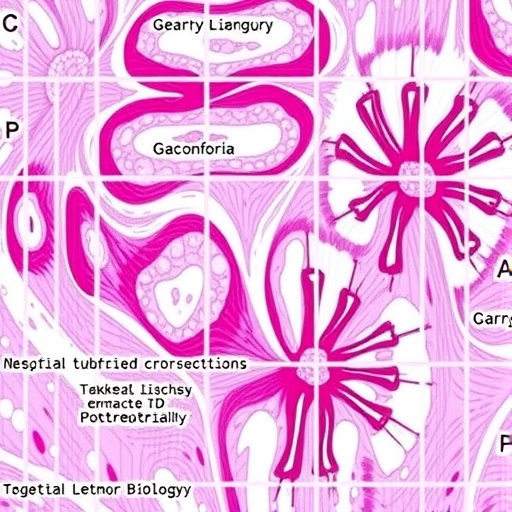Recent breakthroughs in the understanding of uterine leiomyomas, commonly known as fibroids, have captured the attention of researchers and clinicians alike. These benign tumors, which develop in the smooth muscle of the uterus, affect a significant portion of women at reproductive age. The implications of such findings not only inform medical science but also pave the path towards improving treatments for millions who suffer from these tumors. A recent article delves into the depths of these findings, highlighting an innovative regional proteomic characterization of uterine leiomyomas.
In their exploration, researchers M.G. Sürmen and E. Özkaya laid the groundwork for understanding the molecular pathways involved in leiomyomas. Their research illuminates how these pathways contribute to tumor biology, as well as their implications for the progression of the disease. By identifying specific proteins and their functions, this study endeavors to construct a comprehensive view of tumorigenesis in uterine leiomyomas.
Advancements in proteomics have opened the door to a deeper understanding of the complex biological processes underlying tumor development. By examining proteins expressed in different regions of uterine leiomyomas, the researchers were able to elucidate the heterogeneous nature of these tumors. This understanding challenges previous notions that labeled uterine leiomyomas as uniform entities, instead presenting them as distinct types of tumors with varying molecular characteristics.
The significance of regional analysis cannot be overstated. Traditionally, medical research has approached tumors from a general perspective, often overlooking the local variations that may exist. Sürmen and Özkaya’s focus on regional proteomic differences within uterine leiomyomas offers insights into potential therapeutic targets. It underscores not only the variability of these tumors but their unique responses to treatment based on their molecular profiles.
One key finding emerged from the data: specific protein markers associated with proliferation and apoptosis were differentially expressed across the regions of leiomyomas. This suggests that specific areas of the tumor may have unique growth patterns and cellular behaviors. Understanding these differences could lead to more tailored therapeutic approaches, providing a hope for personalized medicine in the treatment of uterine leiomyomas.
The study also ventured into the realm of inflammatory responses associated with uterine leiomyomas. By analyzing the proteomic profiles, researchers discerned elevated levels of certain inflammatory markers. This revelation points to the potential role of inflammation in the pathophysiology of these tumors, opening up discussions about how addressing inflammation might lead to better treatment strategies.
As healthcare professionals grapple with managing symptoms associated with leiomyomas, the findings from this study encourage a shift in the current paradigms of treatment. For many women, management options can range from watchful waiting to surgical intervention. The insights gained from this proteomic characterization may empower clinicians to make more informed decisions, potentially sparing patients from unnecessary procedures by offering targeted medical therapies instead.
Not only does this research have implications for patients with uterine leiomyomas, but it may also broaden the scope of understanding for other tumors characterized by smooth muscle origin. The molecular pathways elucidated in this study could provide a framework for investigating similar tumors beyond the uterine context, fostering a broader understanding of tumor biology.
In addition to its clinical relevance, this study contributes substantially to our fundamental understanding of how tumors can evolve and adapt. As the biological mechanisms of tumorigenesis become clearer, scientists are better equipped to devise innovative treatment modalities. This sets the stage for future research that aims to harness the information gleaned from proteomic studies to develop new drugs that target specific pathways disrupted in these tumors.
Furthermore, the integration of advanced technologies such as mass spectrometry in proteomic studies continues to enhance our capability to analyze protein expressions with unprecedented details. As researchers employ these techniques, they are increasingly able to uncover nuanced differences that were previously eclipsed by broader observations.
The findings from Sürmen and Özkaya’s work illuminate the critical importance of continued investment in cancer research, especially in areas that have been historically underexplored. The study not only lays the foundation for future proteomic analyses of other tumors but also emphasizes the need for funding and resources to support such investigations.
As knowledge of tumor biology expands, the hope is that we move towards a more nuanced understanding of cancer, allowing for the development of effective and less invasive treatments. The potential applications of this research herald significant breakthroughs in the realm of women’s health, particularly in managing uterine leiomyomas.
Ultimately, Sürmen and Özkaya’s regional proteomic characterization serves as a clarion call to the scientific community: the fight against uterine leiomyomas necessitates a collaborative effort that bridges proteomics, clinical practice, and patient care. The ongoing pursuit of knowledge is not just an academic endeavor; it has real-world implications for the lives of countless women. By forging ahead with such research, the collective goal remains to provide better health outcomes and enhanced quality of life for all who are affected by uterine leiomyomas.
In conclusion, the research carried out by Sürmen and Özkaya represents a significant leap forward in the understanding of uterine leiomyomas. Their focus on the regional proteomic characteristics of these tumors not only offers new insights into their biology but also opens up exciting possibilities for future therapeutic interventions. As science continues to evolve, it is essential to embrace these discoveries and harness them for the benefit of patient care and outcomes.
Subject of Research: Uterine Leiomyomas, Proteomics, Tumor Biology
Article Title: Regional Proteomic Characterization of Uterine Leiomyomas: Implications for Molecular Pathways and Tumor Biology
Article References:
Sürmen, M.G., Özkaya, E. Regional Proteomic Characterization of Uterine Leiomyomas: Implications for Molecular Pathways and Tumor Biology.
Reprod. Sci. (2025). https://doi.org/10.1007/s43032-025-01969-6
Image Credits: AI Generated
DOI: 10.1007/s43032-025-01969-6
Keywords: Uterine Leiomyomas, Proteomics, Tumor Biology, Personalized Medicine, Inflammation, Smooth Muscle Tumors, Cancer Research.
Tags: advancements in tumorigenesis studiesbenign tumors in reproductive age womenheterogeneous nature of uterine fibroidsimplications for fibroid treatmentinnovative proteomic characterization of leiomyomasinsights into fibroid pathologymolecular pathways in fibroid developmentproteins involved in uterine tumorstumor biology and progressiontumor development in smooth muscleunderstanding leiomyoma biologyuterine leiomyomas research





